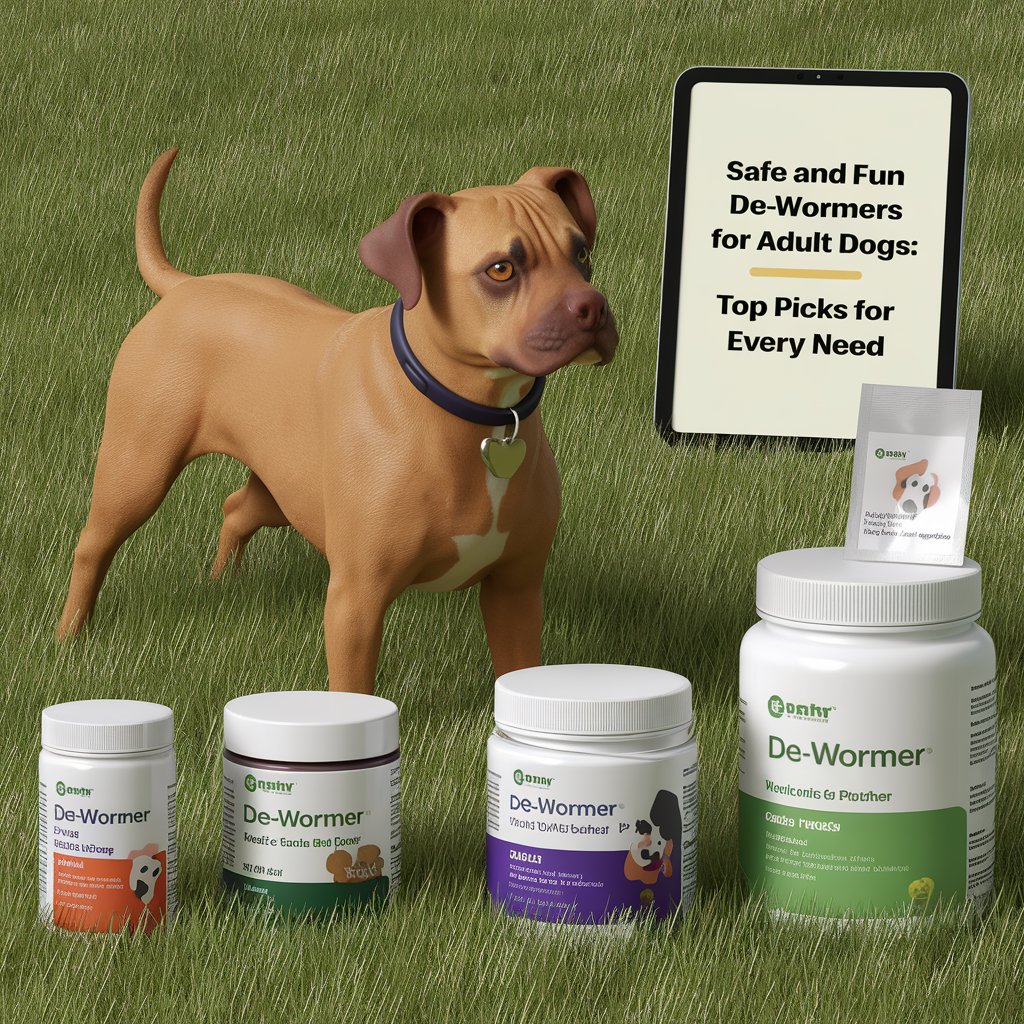When it comes to taking care of your adult dog, ensuring they stay worm-free is crucial. Those pesky parasites don’t just make your furry friend uncomfortable—they can lead to serious health issues if left untreated. But with so many options on the market, how do you choose the best de-wormer for adult dogs? Don’t worry, we’ve got you covered! Let’s dive into what you need to know to keep your pup happy, healthy, and parasite-free.
Why De-Worming Your Adult Dog Is Important
First things first, why should you even bother with de-worming? Worms are more than just a nuisance. They can cause everything from mild discomfort to severe health problems. Common types of worms include roundworms, hookworms, tapeworms, and whipworms, each with its own set of problems. Symptoms can range from a little tummy trouble to severe weight loss, anemia, and even death in extreme cases.
Worms can also be transmitted to humans, especially children who play with infected dogs. So, de-worming your dog isn’t just about keeping your pet healthy—it’s about keeping your whole family safe too!
Factors to Consider When Choosing the Best De-Wormer for Adult Dogs
Not all de-wormers are created equal, and what works for one dog might not work for another. Here’s what you need to keep in mind:
1. Type of Worm
Different de-wormers target different types of worms. Before choosing a product, it’s essential to know which type of worm your dog is dealing with. A visit to the vet can help diagnose the specific parasite and guide you toward the right treatment.
- Roundworms and Hookworms: These are commonly treated with broad-spectrum de-wormers that contain ingredients like pyrantel pamoate.
- Tapeworms: Praziquantel is typically the go-to ingredient for treating tapeworms.
- Whipworms: Products containing fenbendazole are effective against whipworms.

2. Effectiveness
You want a de-wormer that works quickly and thoroughly. Check product reviews and vet recommendations to find the most effective options. Broad-spectrum de-wormers are popular because they cover multiple types of worms in one treatment.
3. Safety
Your dog’s safety is paramount. Look for products approved by veterinarians and avoid those with a high incidence of side effects. Ensure the de-wormer is suitable for your dog’s age, weight, and overall health condition.
4. Ease of Administration
Some dogs will happily eat anything you give them, while others are a bit more picky. De-wormers come in various forms: chewable tablets, liquid, and even flavored treats. Choose a form that your dog will take without too much fuss.
5. Frequency of Treatment
Some de-wormers require a single dose, while others need to be given over several days. Consider your schedule and your dog’s tolerance when choosing a product. Remember, consistency is key to ensuring the worms are entirely eradicated.
6. Cost
While it’s tempting to go for the cheapest option, remember that you often get what you pay for. Balancing cost with effectiveness and safety is important. Don’t skimp on your dog’s health by choosing a subpar product.
Understanding De-Wormer Ingredients
De-wormers contain active ingredients that target specific parasites. Here’s a quick rundown of the most common ingredients:
- Pyrantel Pamoate: Effective against roundworms and hookworms. It paralyzes the worms, allowing them to be expelled through the digestive system.
- Praziquantel: Targets tapeworms by breaking down the worm’s outer layer, which is then digested by the dog’s stomach.
- Fenbendazole: A broad-spectrum de-wormer effective against whipworms, roundworms, hookworms, and some tapeworms.
- Ivermectin: Often used in heartworm prevention but also effective against some intestinal worms.
Each ingredient has its own strengths and weaknesses, so it’s crucial to match the de-wormer to the specific type of worm your dog has.
The Importance of Regular De-Worming
Even if your dog isn’t showing any symptoms, regular de-worming is essential. Worms can be picked up from a variety of sources: soil, other animals, even fleas! Vets typically recommend de-worming adult dogs every three months, but this can vary depending on your dog’s lifestyle and risk factors.
Common Signs Your Dog May Have Worms
Not sure if your dog needs de-worming? Keep an eye out for these common signs:
- Weight Loss: Worms can rob your dog of essential nutrients, leading to unexplained weight loss.
- Scooting: If your dog is dragging its bottom along the ground, it could be a sign of worms (or other issues like anal gland problems).
- Diarrhea: Worms can irritate the intestines, leading to diarrhea or bloody stools.
- Vomiting: Some dogs may vomit up worms, particularly if the infestation is severe.
- Dull Coat: A healthy dog usually has a shiny coat. If your dog’s fur is looking dull or patchy, worms might be to blame.
- Visible Worms: In some cases, you might see worms in your dog’s stool or vomit. If you do, a trip to the vet is in order!
Tips for Administering De-Wormer to Your Dog
Administering medicine to your dog can be a challenge. Here are some tips to make the process easier:
- Disguise It: Hide the de-wormer in a treat, peanut butter, or your dog’s favorite food. This works particularly well for tablets and pills.
- Use a Pill Pocket: These specially designed treats have a hole for placing a pill inside. Most dogs won’t notice the difference!
- Liquid Form: If your dog is averse to tablets, try a liquid de-wormer that can be mixed into their food or squirted directly into their mouth.
- Chewable Tablets: Some de-wormers come in chewable forms that taste like a treat. Most dogs find these more palatable.
- Ask for Help: If your dog is particularly stubborn, enlist the help of a friend or family member to hold your dog still while you administer the medication.

The Role of Your Vet in Choosing a De-Wormer
While there are plenty of over-the-counter de-wormers available, it’s always best to consult your vet before starting any treatment. Your vet can:
- Diagnose the Specific Worm: Using a stool sample, your vet can identify the type of worm and recommend the most effective treatment.
- Prescribe a De-Wormer: Some worms are resistant to certain over-the-counter de-wormers, so a prescription may be necessary.
- Monitor Your Dog: If your dog has a heavy worm infestation or is otherwise unwell, your vet can monitor their response to treatment and adjust the dosage if needed.
Preventing Future Worm Infestations
Once your dog is worm-free, you’ll want to keep it that way. Here’s how:
- Regular Vet Visits: Regular check-ups can catch worms before they become a serious problem.
- Clean Up After Your Dog: Worm eggs are often found in dog feces, so promptly cleaning up after your dog can reduce the risk of re-infestation.
- Flea Control: Fleas are a common carrier of tapeworms. Keeping your dog flea-free is a crucial step in preventing worm infestations.
- Safe Eating Habits: Don’t let your dog eat raw meat, dead animals, or scavenge through garbage, as these are common sources of worms.
- Keep Their Environment Clean: Regularly clean your dog’s bedding and toys to reduce the risk of worm eggs taking hold.
Conclusion: The Best De-Wormer for Adult Dogs
Choosing the best de-wormer for adult dogs isn’t just about picking the first product you see on the shelf. It requires a little research, a chat with your vet, and a good understanding of your dog’s specific needs. With the right de-wormer, you can keep those pesky parasites at bay, ensuring your dog stays healthy and happy for years to come.
Remember, a worm-free dog is a happy dog—and a happy dog makes for a happy dog owner! So, take the time to choose the best de-wormer for your adult dog, and enjoy the peace of mind that comes with knowing your furry friend is protected.












Discussion about this post